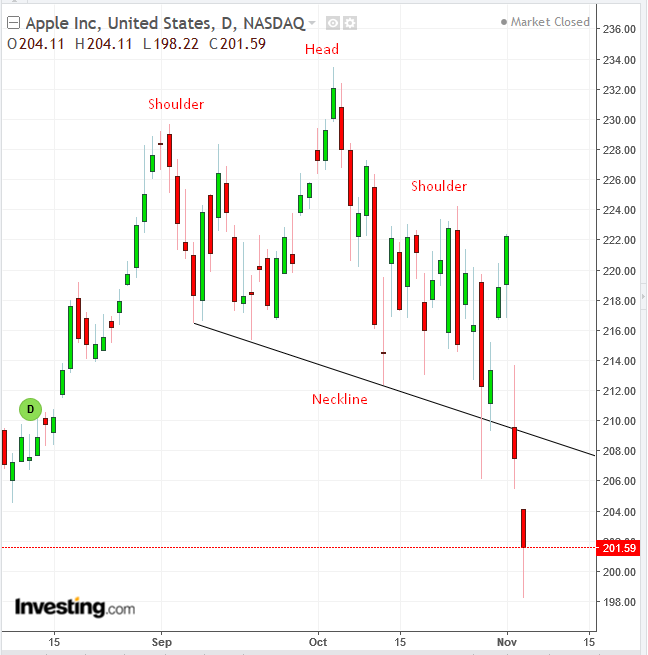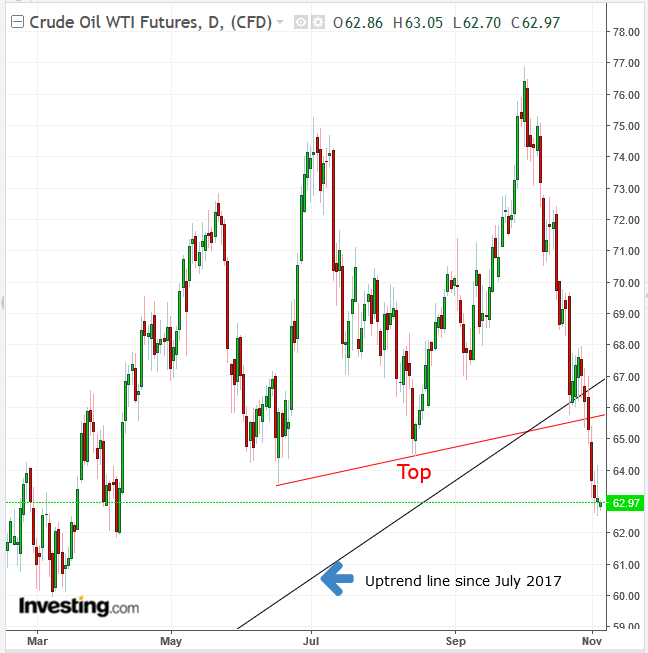- US futures, European shares show weakness ahead of crucial US midterm vote
- Berkshire Hathaway surges; Apple, tech stocks tumble, prompting broader selling
- Oil keeps sliding on Iran bypassing sanctions, US waivers on purchases
Key Events
Global stocks were mixed on Tuesday as investors awaited the results of the US midterm elections. Shares in Europe slipped lower alongside futures for the S&P 500, Dow and NASDAQ 100, while Asian indices ended mostly higher. Treasury yields edged lower, the dollar reversed early losses and the pound sterling extended an advance on Brexit hopes.
The STOXX Europe 600 gave up earlier gains, dragged down by financials and carmakers.
Earlier, during the Asian session, Japan’s Nikkei 225 outperformed with a 1.05 percent advance and China's Shanghai Composite underperformed with a 0.23 percent slide, even as Chinese Vice President Wang Quishan said that he’s ready to discuss trade solutions with the US.
Global Financial Affairs
Yesterday, US Treasury yields pulled back from a near-month high and shares gained ground, boosted by Berkshire Hathaway (NYSE:BRKa). Warren Buffett's multinational financial conglomerate climbed the most since July after the company’s regulatory filing, which was published on Saturday, revealed it bought back $928 million worth of shares.
As well, dip buyers took advantage of October’s brutal selloffs, after the Dow Jones dropped 1,300 points, or 5 percent—the most since the January 2016 correction. The S&P 500 plunged almost 7 percent over the month, suffering its worst loss since September 2011, and the NASDAQ Composite took its most significant hit since November 2008, a whopping 9 percent.
During Monday's session, the SPX climbed 0.56 percent, with Energy shares outperforming (+1.67 percent), even as oil prices continued to fall. Real Estate also inched higher (+1.66 percent), on upbeat economic data, even against a backdrop of rising rates, which could weigh on REIT profits. Berkshire Hathaway's ranking as the world's second-biggest real-estate broker also boosted the broader sector.
Financials advanced (+1.59 percent) on a stronger outlook for interest rate tightening following Friday’s NFP beat and the highest annual wage gain since before the financial crisis. Communication Services (-0.41 percent) was the day's laggard, followed by Technology (-0.1 percent), which was dragged lower by Apple (NASDAQ:AAPL), Facebook (NASDAQ:FB) and Amazon (NASDAQ:AMZN).

Apple's share price slid 2.84 percent yesterday, for a total two-day loss of 9.34, after reports surfaced that the iPhone maker wouldn’t boost iPhone production. This comes after the company hit a $10 billion all-time high for services revenue—a crucial component for tech companies making the transition from product sales to services. The stock's intraday low price reached 45 percent off the $190 objective we pinpointed last week. For those who missed the opportunity, look for a bounce as part of a return move to test the reversal’s integrity.
Even after yesterday's rally, the S&P 500 Index remains below the triple resistance of the uptrend line since the February 2016 bottom, the 200 DMA and a bearish flag, drawing a supply-demand nexus line in the sand.
The Dow outperformed, gaining 0.76 percent. The NASDAQ underperformed, losing 0.38 percent.
US politics and central bank policy decisions from the Fed, Reserve Bank of Australia and Reserve Bank of New Zealand dominate a busy week for markets. The US midterm elections are considered a referendum on President Donald Trump's policies. Meanwhile, investors are also monitoring Brexit developments, with British Prime Minister Theresa May redoubling efforts to strike a deal with EU counterparts ahead of a cabinet meeting later today.

In commodity markets, oil is slipping lower for the seventh straight session on yesterday's reports that Iran was shunning US sanctions to resume selling and that the US itself had granted waivers to eight oil-importing countries. The WTI price remains under pressure after crossing below the 200 DMA, the uptrend line since June 2017 and after topping out.
Up Ahead
- On Tuesday, U.S. midterm elections will determine whether Republicans keep control of Congress, setting the stage for Trump’s 2020 re-election bid
- Fed policymakers are expected to leave the main interest rate unchanged on Thursday at their penultimate monetary policy meeting of the year
Market Moves
Stocks
- The Stoxx Europe 600 dropped 0.1 percent as of 8:55 a.m. London time.
- Futures on the S&P 500 fell 0.1 percent.
- The MSCI All-Country World Index gained 0.1 percent, hitting the highest level in more than two weeks with its sixth consecutive advance.
- The MSCI Emerging Market Index slipped by less than 0.05 percent.
Currencies
- The Bloomberg Dollar Spot Index fell 0.1 percent to the lowest level in more than a week.
- The euro advanced 0.1 percent to $1.1422, the strongest level in two weeks.
- The Japanese yen dipped 0.1 percent to 113.26 per dollar, the weakest in more than a month.
- The British pound jumped 0.3 percent to $1.3078, the strongest in almost three weeks.
- The MSCI Emerging Markets Currency Index climbed 0.1 percent.
Bonds
- The yield on 10-year Treasuries climbed less than one basis point to 3.20 percent.
- Germany’s 10-year yield was unchanged at 0.43 percent.
- Britain’s 10-year yield gained one basis point to 1.515 percent, reaching the highest level in more than two weeks on its seventh straight advance.
- The spread of Italy’s 10-year bonds over Germany’s advanced three basis points to 2.9326 percentage points.
Commodities
- The Bloomberg Commodity Index dropped 0.2 percent.
- West Texas Intermediate crude fell 0.4 percent to $62.85 a barrel, hitting the lowest level in seven months with its seventh straight decline.
- LME copper sipped 0.2 percent to $6,180.00 per metric ton.
- Gold gained 0.2 percent to $1,234.10 an ounce, the highest in 16 weeks.
